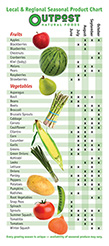GMO Labeling
Last updated: July 22, 2016
Congress passes S. 764
Senate Bill S.764 - the Roberts- Stabenow GMO Labeling Bill - was introduced as compromise legislation. It was passed by both the Senate and the House and is off to the President to be signed into law. It is expected the President will sign the bill into law. The bill allows for a measure of mandatory GMO labeling, and relies on the consumer to take individual action for acquiring information.
What does this mean? The USDA has two years to set up a federal system of regulations. GMO containing product labels must use at least one of three designations:
1. On-package written disclosure
2. On-package quick response (QR) code
3. On-package symbol
For more information on this, on what kinds of genetic engineering must be disclosed, how the law differs from previously proposed legislation and why National Co+op Grocers, and Outpost, will continue to advocate for a simple written label, READ HERE.
ALSO: NPR - Congress Just Passed a GMO Labeling Law and Nobody's Super Happy About It
REJECTED! - Senate votes down S.2609
A victory for the right to know what's in our food. Thank you to all who lent their voices to our Senators to do the right thing and vote NO. (READ ABOUT IT)
Food Policy Action has compiled a list of those senators who blocked the DARK Act.
Senate Bill S.2609 - The amended DARK Act (HR1599)
Senate Bill S.2609 - An original bill to amend the Agricultural Marketing Act of 1946 . . . to require the Secretary of Agriculture to establish a national voluntary labeling standard for ... bioengineered foods, and for other purposes.
On February 19, 2016, Kansas Senator Pat Roberts (R) released a new bill for review to the Senate Agriculture, Nutrition & Forestry Committee similar to HR1599. It has been voted through and out of committee. This new bill - S. 2609 - will be debated and put to a vote on the Senate floor. Notable difference from the original House bill is that the language supports 'voluntary' labeling and leaves out language regarding the term 'natural.'
This is a Senate bill in the United States Congress (indicated by the “S.” in “S. 2609”). A bill must be passed by both the House and Senate in identical form and then be signed by the President to become law.
IMPORTANT TO NOTE: The original HR1599 Safe and Accurate Food Labeling Act bill PASSED in the House on July 23, 2015, but it later failed in the Senate. Because so much of S.2609 is similar to the original House bill, it will most likely be accepted by the House without a debate.
Take Action TODAY!
Want GMOs Labeled? Contact Congress!
If you would like see GMO foods labeled, now is a critical time to contact your elected officials. Right now, the Senate will begin debating a proposed law that would block mandatory GMO labeling at the national and state levels. This new bill establishes new barriers to a national mandatory labeling system, and undermines the public will by nullifying GMO labeling laws already on the books in Vermont, Connecticut and Maine. It would also prevent states from passing any future GMO labeling laws. Check out this article for more info: GMO Labeling: A Pivotal Moment.
Mandatory GMO labeling advocates dubbed the original bill (HR1599) the Denying Americans the Right-to-Know, or DARK Act. This new bill is an amended version and we continue to agree that it would deny Americans the right to know what’s in their food. Outpost Natural Foods opposes this bill.
Contact Congress: Three Easy Steps
It has been demonstrated that making direct contact with your elected representatives makes a stronger and more lasting impact that signing your name to an email petition. It takes only about ten minutes to contact your representatives using the GovTrack website. Just follow these steps:
- Go to the bill’s page. https://www.govtrack.us/congress/bills/114/s2609
- Click “Call Congress” and follow the prompts. If you support mandatory GMO labeling, click “ I oppose S.2609”. You will be able to look up your representatives by entering your address, and have an opportunity to email your lawmaker or have a congressional staffer call you at a number you provide.
- Remember to complete steps #1 and #2 for your two Senators and one House Representative.
If you’re feeling shy or nervous about communicating your viewpoints, know that your phone call or email will be answered by a staff person who has been trained to listen to your viewpoint and convey it to your congressperson—they will not debate or challenge you. For more tips, see How to Contact Congress.
The Basics
You may find some of the following points helpful as a general guide. Visit www.justlabelit.org for more information.
"As a [citizen, parent, chef, farmer, etc.], I want to know what’s in the food I’m eating and feeding my family. That is why I support mandatory GMO labeling. I urge you to oppose Senate Bill S.2609."
The Senate version of the “Deny Americans the Right to Know” (DARK) Act would:
- Preempt states from requiring labeling of GMO foods.
- Strip the Food and Drug Administration of its jurisdiction over GMO food disclosures.
- Make it harder for companies like Campbell’s Soup to voluntarily disclose the presence of GMOs.
- Make it the responsibility of USDA to promote biotechnology to consumers.
- Continue the current, broken voluntary labeling system.
Americans want the Right to Know
Polls show nearly 90 percent of Americans - regardless of their age, income, education or party affiliation - support on package labeling of GMO food.
64 nations require labeling including Russia, China, the EU, and important trading partners in Asia.
More than 4 million Americans have joined a petition urging FDA to require labeling of GMO food.
Hundreds of food companies urged President Obama to honor his pledge to require GMO labeling.
Americans want an on package disclosure for GMO foods:
New polling show that more than 88% of Americans want an on package label vs. a QR code.
QR codes are not an effective way for consumers to get information.
GMO Labeling Will Not Necessarily Increase Food Prices
Food manufacturers frequently change labels to highlight new innovations or to make new claims. Requiring GMO disclosure does not have to increase the cost of producing food. According to Consumer Reports, mandatory GMO labels would increase food prices by less a penny per day.
GMO Crops Have Increased Herbicide Applications
Herbicide applications have increased with the advent of GMO crops. Because most GMO crops are engineered to withstand heavy applications of glyphosate, this herbicide’s use increased by 527 million pounds between 1996 and 2011. Glyphosate is now routinely found in our food, air and water and is considered a probable human carcinogen by the World Health Organization.
GMO crops have led many farmers to turn to more toxic herbicides. The overuse of glyphosate has resulted in the growth of “superweeds,” and many farmers are turning to more toxic pesticides in an effort to control them.
A second generation of GMO crops engineered to be used with more toxic herbicides such as dicamba and 2,4-D are expected to enter the marketplace soon. USDA estimates that these new GMO crops will increase the use of 2,4-D in the U.S. by three- to seven-fold by 2020, and could result in a tenfold increase in dicamba use.
GMO Crops are Not Necessary to Feed the World
Since the introduction of GMOs 20 years ago, yield increases for GMO and conventional varieties of corn and soybeans have been the same. So far, most GMO crops have been designed to reduce farm labor, not increase yields.
Most GMO corn, soybeans and alfalfa are fed to animals or used to produce biofuels, not food consumed by people.
American farmers do not feed the world. U.S. farmers produce less than 8% of all global calories.








